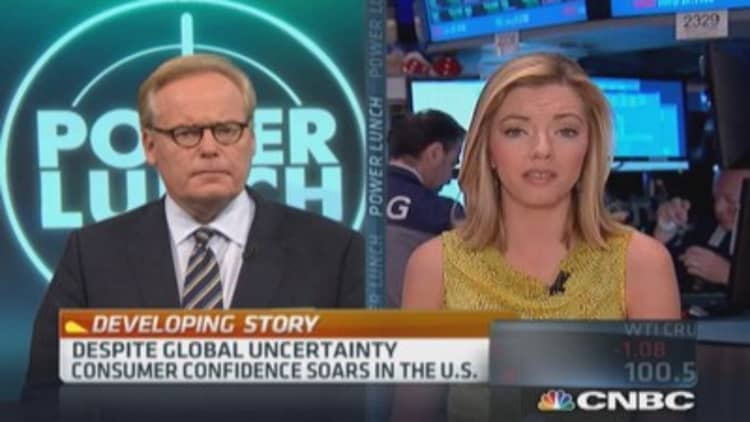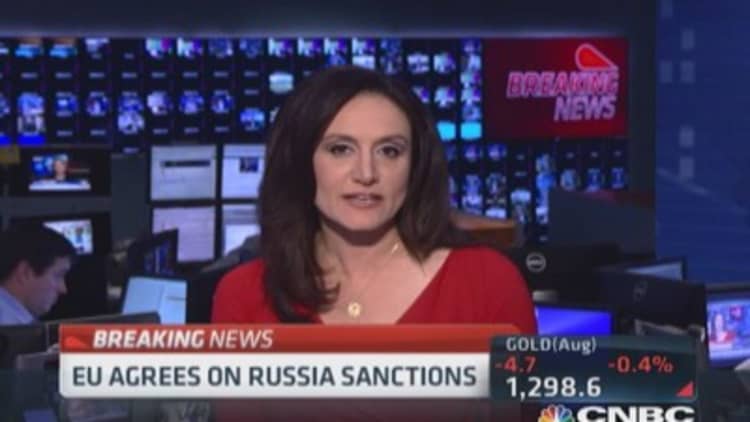
European Union governments reached a deal on Tuesday to impose economic sanctions against Russia, targeting its oil industry, defense, dual-use goods and sensitive technologies, diplomats said, marking a new phase in the biggest confrontation between Moscow and the West since the Cold War.
The EU action was unavoidable, German Chancellor Angela Merkel said on Tuesday, and Russia must decide whether it will take a path of de-escalation and cooperation.
The sanctions will limit Russia's access to EU capital markets, impose an embargo on trade in arms, establish an export ban for dual-use goods for military end users, and curtail Russian access to sensitive technologies particularly in the field of the oil sector, EU government officials said in a statement on Tuesday.
"This package reinforces the recently expanded listing of persons and entities undermining Ukrainian territorial integrity and sovereignty, including the so-called 'cronies', the suspension of EIB and EBRD financing, the restriction of investment and trade with Crimea and Sevastopol and the reassessment of the Russia EU bilateral cooperation with a view to reducing the level of the cooperation," the statement said.
Also on Tuesday, the White House said the U.S. could announce new sanction on Russia "as soon as today."
Read MoreObama tells Putin that Russia broke nuclear treaty
The EU sanctions will initially last a year, but will be reviewed after three months, the diplomats said.
The sanctions mark a fundamental change in how Europe deals with Russia, one which carries risks not just for Moscow but for Europe itself.
"The impact on trade is relatively small. The far bigger risk is a knock to overall economic confidence," said Gregor Eder, an economist with Allianz, one of the world's largest fund investors.
"A spiral of sanctions together with the loss of overall confidence could be enough to bring the already fragile economic recovery in Europe to a halt,'' Eder said.
The measures will shut state-owned Russian banks out of European capital markets. which could affect European holders of Russian debt and financial services firms that do business there. Other sanction targets include the defense sector and sensitive technologies, including oil, but exclude the vital gas sector, on which Europe is heavily dependent.
Dutch Foreign Minister Frans Timmermans, whose call for justice swayed EU peers last week, said the capital market restrictions "will have a far-reaching and immediate effect."
Timmermans, speaking during a debate about the downing of a Malaysian airliner over rebel-held eastern Ukraine that killed 298 people, most of them Dutch, said the sanctions would send a strong signal to Moscow that "you are on the wrong path."
The deal, which does not require endorsement at a special EU summit, followed an agreement to widen sanctions on Moscow between U.S. President Barack Obama and the leaders of Britain, France, Germany and Italy in a telephone conference on Monday.
In contrast to the United States, the 28-nation EU, with bigger economic interests at stake, hesitated for months to take decisive action against Moscow.
But the mood changed radically after the downing of a civilian flight in an area of Ukraine controlled by pro-Russian separatists earlier this month, killing all 298 people on board, including 194 Dutch citizens.
Washington believes Flight MH17 was shot down in error by the separatists with a missile supplied by Russia. Moscow has denied any involvement and sought to deflect the blame to Kiev.
EU ambassadors clinched their agreement as intense fighting between Ukrainian troops and pro-Russian rebels in eastern Ukraine killed dozens of civilians, soldiers and rebels.
It is expected to be finalized on Wednesday and the measures published in the bloc's Official Journal.
Economic risk
Previously, Washington and Brussels have imposed sanctions on specific individuals over Moscow's actions toward Ukraine, but the EU in particular had shied away from measures designed to hurt vital sectors of the Russian economy.
The knock to confidence from harsher European sanctions on Russia could spoil the euro zone's budding economic recovery even if it shrugs off the fallout on trade.
The EU does more than 10 times as much trade with Russia as the United States, relying in particular on Russian natural gas to fuel its industry and power its cities.
Read MoreInvestigate Putin for war crimes: ex-WH adviser
Some of the bloc's 28 member states are nervous about the risk to their own economies, and EU leaders are seeking to strike a balance between inflicting pain on Russia and preventing fragile EU nations from sliding back into recession.
Examples of how sanctions could strike home include the fact that German energy giant E.ON has invested 6 billion euros since 2007 in Russia, while the Nethlerands port of Rotterdam was the single largest designation for Russian exports last year.
Some diplomats cautioned that Tuesday's talks might stop short of a final deal, while others said negotiations would probably last for many hours.
Maja Kocijancic, a spokeswoman for EU foreign policy chief Catherine Ashton, told reporters on Tuesday the diplomats were debating detailed legal proposals and that inevitably took time.

In a letter to EU leaders last week, European Council President Herman Van Rompuy said the proposed sanctions package "should have a strong impact on Russia's economy while keeping a moderate effect on EU economies."
Read MoreBackfire? How Russia sanctions could hit Europe
There was "an emerging consensus," he said, on some key principles, including only targeting future contracts, which would leave France free to go ahead with the delivery of the first of two helicopter carrier ships is it building for Russia.
Another principle was that EU measures targeting energy technology could hit Russia's oil sector but not its natural gas. Russia is the world's biggest exporter of gas and second-biggest exporter of oil; Europe depends on it far more for gas, which arrives mainly by pipeline and is harder to source from elsewhere than oil that arrives mostly by ship.
Probably the most high-impact measure will ban Europeans from buying new bonds or shares issued by banks owned 50 percent or more by the Russian state, which analysts say will affect their ability to finance the economy.
Apart from agreeing on the economic measures, ambassadors also signed off on a new list of Russian President Vladimir Putin's associates and companies that will face asset freezes and visa bans under previous measures, the criteria for which were toughened the day before the plane crash.
The new list is expected to be made public on Wednesday, adding to the 87 people and 20 organizations already hit with asset freezes for playing a role in threatening Ukraine.
"These sanctions are harder than anything we have ever had before," said James Nixey of British think tank Chatham House. "It will hurt a little bit but it's a down payment on the future security of Europe. It's a question of Western credibility."
—By Reuters. CNBC.com contributed to this report.

